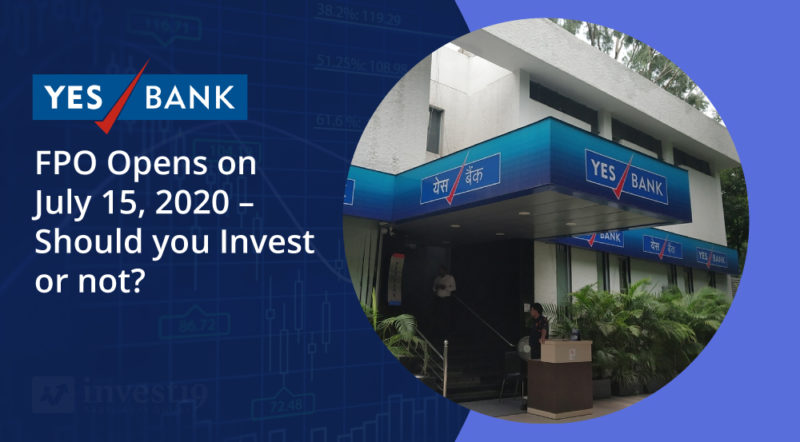On July 15, 2020, the private sector lender Yes Bank will launch its 15,000 crores follow-up public offering (FPO) with the objects of ensuring adequate capital to support growth and expansion, debt repayment, and enhancing capital adequacy ratio. Headquartered in Mumbai, the Yes Bank has a pan-India presence across all 28 states and 8 Union Territories of India; providing a wide range of services and technology-driven offerings to corporates, MSME & retail customers since 2004.
It provides investment banking, merchant banking & brokerage business through Yes Securities and mutual fund business through Yes Asset Management Limited (YAML).
Yes Bank – Financial Information
| Particulars | Fiscal 2020 | Fiscal 2019 | Fiscal 2018 |
| Share capital | 25,100.94 | 4,630.07 | 4,605.93 |
| Net worth | 216,949.60 | 268,874.10 | 257,525.07 |
| Revenue | 380,081.16 | 342,992.80 | 255,617.46 |
| Profit after tax | (164,325.80) | 17,092.66 | 42,332.20 |
| Earnings per share (basic) | (56.11) | 7.40 | 18.46 |
| Net asset value per Equity Share | 17.29 | 116.14 | 111.82 |
| Total borrowings | 1,137,905.03 | 1,084,241.09 | 748,935.81 |
Yes Bank FPO Details
| IPO Date | Jul 15, 2020 – Jul 17, 2020 |
| Issue Type | Book Built Issue FPO |
| Issue Size | [.] Eq Shares of ₹2 (aggregating up to ₹15,000.00 Cr) |
| Fresh Issue | [.] Eq Shares of ₹2 (aggregating up to ₹15,000.00 Cr) |
| Face Value | ₹2 per equity share |
| IPO Price | ₹12 to ₹13 per equity share |
| Employee Discount | ₹1 per share |
| Market Lot | 1000 Shares |
| Min Order Quantity | 1000 Shares |
| Listing At | BSE, NSE |
| Bid/Offer Opens On | Jul 15, 2020 |
| Bid/Offer Closes On | Jul 17, 2020 |
| Finalisation of Basis of Allotment | Jul 22, 2020 |
| Initiation of Refunds | Jul 23, 2020 |
| Credit of Shares to Demat Acct | Jul 24, 2020 |
| IPO Shares Listing Date | Jul 27, 2020 |
| Application | Lots | Shares | Amount (Cut-off) |
| Minimum | 1 | 1000 | ₹13,000 |
| Maximum | 15 | 15000 | ₹195,000 |
Risk Factors – Things to Consider Before Investing in Yes Bank FPO
Yes Bank has grown into a ‘Full-Service Commercial Bank’ and providing a wide array of services and offerings while serving in the private sector. Due to recent norms and structural reforms within the banking industry; and policy changes, including the relief package by the government to mitigate the COVID-19 impact, affects the banking industry including the private and public sector banks.
Below we’ve enlisted some of the key risk factors that you must consider before investing in Yes Bank FPO:
- An increase in the portfolio of NPAs or NPIs, RBI-mandated provisioning requirements could adversely impact the financial performance of the bank. In the ongoing COVID-19 pandemic has impacted the customer base of the Yes Bank which could lead to the delinquency in loan repayments and other obligations, which, in turn, could result in a higher level of NPAs in the corporate and retail loan portfolio.
- Similar to other banks, the Yes Bank is also subject to the periodic inspections by the Reserve Bank of India (RBI) under the Banking Regulation Act. If the bank fails to comply with, the bank could be subject to supervisory inspections and penalties which could adversely affect the bank’s reputation, business, and financial condition.
- The bank is exposed to the risk of significant deterioration in the overall performance of a particular sector driven by the events, not within the bank’s control, and could increase the level of NPAs. So, in the course of business, the bank is exposed to loan concentrations w.r.t specific borrowers and corporate borrowers. If defaulted by them, it could lead to a situation which could adversely impact the business, operations, and financial conditions of the bank.
Apart from this, there are a lot of other risk factors that one should go through before investing in Yes Bank FPO. To get more information, one can go through the red-herring prospectus of Yes Bank IPO. Yes Bank’s new management has emerged out with the strategic objective to rebuild the bank and calibrate growth over the next twelve months. In 2019-20, the Yes Bank reported a net loss of Rs. 16,432.58 crore, hit by provisions that increased more than four-fold to Rs. 28,312.49 crore during the year.
Before Yes Bank FPO, the share price of Yes Bank has fallen over 21 percent. Opened with a loss of 3.62 percent today, the stock fell to 8.37 percent later in the session to the intraday low of Rs. 20.25 on BSE.
The increased level of NPAs resulted in an increased in PCR and loss in results for FY20. Therefore, it would be recommendable to be prudent before investing in Yes Bank FPO especially during the times of pandemic.
